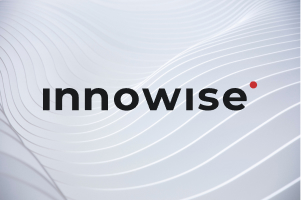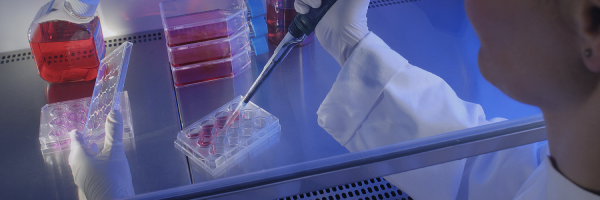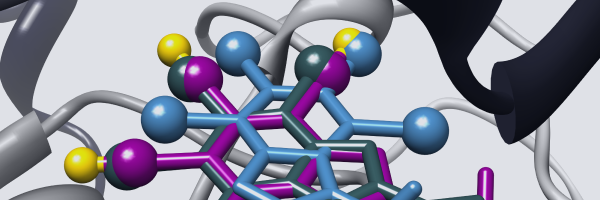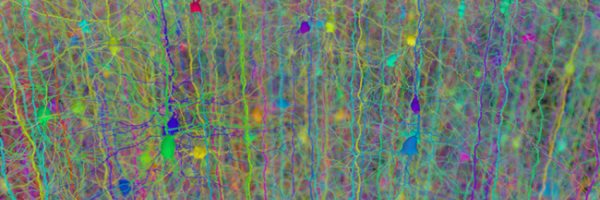Your message has been sent.
We’ll process your request and contact you back as soon as possible.
The form has been successfully submitted.
Please find further information in your mailbox.


AI is transforming the pharmaceutical industry, and one of the most significant areas of impact is in the drug discovery process. Using advanced machine learning algorithms, such as transformer models and graph neural networks, and vast amounts of data, AI is accelerating the discovery of new treatments and improving the efficiency of the entire development process.
Before designing a drug, we need to pinpoint the therapeutic target – a specific enzyme, a mutated gene, or a critical signaling pathway. Through analysis of large-scale biological data, including genomic and transcriptomic information from next-generation sequencing (NGS), AI helps identify the best therapeutic opportunities, uncover complex patterns and connections that traditional methods may miss. This leads to the discovery of new targets and innovative treatments.

AI optimizes pre-clinical research, mining data from in vitro and in vivo studies to predict compound efficacy and toxicity. This method helps researchers make smart choices about which compounds to pursue and thus save both time and resources. Furthermore, AI can optimize experimental design in pre-clinic selection of drug candidates for further development.

AI is changing drug design with the generation of novel molecular structures optimized for efficacy and safety. AI algorithms identify promising candidates and explore chemical space beyond the limitations of traditional methods by analyzing massive datasets of existing compounds and their target interactions. This accelerates the discovery of innovative treatments with the potential to address unmet medical needs.

AI-powered predictive modeling and simulation further refines drug design by mimicking the behavior of complex biological systems. This in silico approach predicts drug performance at various stages, from absorption and distribution to metabolism and excretion: this way, the researchers can easily identify drug candidates for desired properties prior to costly experimental testing. This significantly improves the chances of clinical success.

AI is playing an increasingly important role in clinical trials. It's used to analyze data from previous trials, identify patterns, and predict potential issues. This helps researchers design better trials, find the right patients, and increase the chances of a successful outcome while reducing costs and timelines. AI can also help them easily find and recruit patients for clinical trials. It can match patients to trials based on their specific characteristics and the trial criteria.

The advancement of personalized medicine is supported by AI's ability to analyze large amounts of patient genomic data and medical history to identify individual biomarkers and develop targeted therapies. In addition, AI is analyzing real-world evidence and post-marketing surveillance data to identify potential safety issues and improve treatment outcomes in real-world settings.

Before designing a drug, we need to pinpoint the therapeutic target – a specific enzyme, a mutated gene, or a critical signaling pathway. Through analysis of large-scale biological data, including genomic and transcriptomic information from next-generation sequencing (NGS), AI helps identify the best therapeutic opportunities, uncover complex patterns and connections that traditional methods may miss. This leads to the discovery of new targets and innovative treatments.

AI optimizes pre-clinical research, mining data from in vitro and in vivo studies to predict compound efficacy and toxicity. This method helps researchers make smart choices about which compounds to pursue and thus save both time and resources. Furthermore, AI can optimize experimental design in pre-clinic selection of drug candidates for further development.

AI is changing drug design with the generation of novel molecular structures optimized for efficacy and safety. AI algorithms identify promising candidates and explore chemical space beyond the limitations of traditional methods by analyzing massive datasets of existing compounds and their target interactions. This accelerates the discovery of innovative treatments with the potential to address unmet medical needs.

AI-powered predictive modeling and simulation further refines drug design by mimicking the behavior of complex biological systems. This in silico approach predicts drug performance at various stages, from absorption and distribution to metabolism and excretion: this way, the researchers can easily identify drug candidates for desired properties prior to costly experimental testing. This significantly improves the chances of clinical success.

AI is playing an increasingly important role in clinical trials. It's used to analyze data from previous trials, identify patterns, and predict potential issues. This helps researchers design better trials, find the right patients, and increase the chances of a successful outcome while reducing costs and timelines. AI can also help them easily find and recruit patients for clinical trials. It can match patients to trials based on their specific characteristics and the trial criteria.

The advancement of personalized medicine is supported by AI's ability to analyze large amounts of patient genomic data and medical history to identify individual biomarkers and develop targeted therapies. In addition, AI is analyzing real-world evidence and post-marketing surveillance data to identify potential safety issues and improve treatment outcomes in real-world settings.

Multiomics data analysis
Clinical data analysis
Scientific research data analysis
De novo drug design
ML + molecular dynamics
ML + molecular docking
ML + pharmacokinetic modeling
Hit identification
Patient stratification
Data mining
Drug optimization

Improve your AI-driven drug discovery with Innowise.
AI is a total change-maker in the pharmaceutical industry: it offers lots of benefits that make the drug discovery and development process smoother and more efficient.
Thanks to the rapid analysis of vast datasets, ML algorithms expedite every stage, from target identification and lead optimization to clinical trial design and drug repurposing. Compared to traditional methods, this accelerated pace significantly shortens development timelines and reduces costs.

Correctly trained AI models are able to predict critical properties like target binding affinity, pharmacokinetic/pharmacodynamic profiles, and ADMET properties — and therefore help researchers design drugs with enhanced efficacy. This AI-driven approach optimizes drug candidates for improved target engagement, reduced toxicity, and ultimately, better patient outcomes.

AI models also help optimize clinical trial design by identifying ideal patient cohorts through predictive biomarkers and refining trial protocols for efficiency. This targeted approach increases the probability of successful trial outcomes and accelerates the delivery of life-changing medications to patients.

AI significantly increases the predictive power of drug discovery and helps researchers to forecast drug behavior, efficacy, and safety profiles. Using a variety of techniques, AI identifies promising candidates and potential liabilities early and accelerates development timelines.

AI algorithms analyze large data sets to identify new therapeutic applications for existing drugs. This drug repurposing strategy accelerates the development timeline because these drugs already have established safety profiles and clinical data, which decreases the need for extensive and costly de novo trials.

AI analyzes patient-specific data, including genetic and molecular profiles, to tailor treatments for optimal efficacy. For example, AI can predict an individual's response to a specific chemotherapy regimen based on their tumor's genetic makeup so that oncologists can select the most effective treatment while minimizing adverse reactions. This personalized approach maximizes the benefit of an individual patient.

AI automates high-throughput screening of vast compound libraries to identify promising drug candidates with greater efficiency than traditional methods. Through analysis of molecular structures and predicting their interactions with target proteins, AI can prioritize compounds with the highest likelihood of success, which significantly reduces the time and cost associated with early stages of drug discovery.

AI algorithms analyze the interplay of ingredients and their impact on stability, solubility, and bioavailability and predict optimal drug formulations. For instance, AI can model how different excipients affect a drug's dissolution rate and absorption in the gastrointestinal tract, which leads to improved drug efficacy, easier administration (e.g., oral instead of intravenous), and better patient compliance.

AI-powered analytics identifies ideal candidates for clinical trials based on a comprehensive analysis of patient data, including medical history, demographics, and genetic information. It identifies patients most likely to respond positively to a treatment. This targeted recruitment strategy improves trial efficiency, increases success rates, and ultimately accelerates the delivery of new therapies to patients.

Thanks to the rapid analysis of vast datasets, ML algorithms expedite every stage, from target identification and lead optimization to clinical trial design and drug repurposing. Compared to traditional methods, this accelerated pace significantly shortens development timelines and reduces costs.

Correctly trained AI models are able to predict critical properties like target binding affinity, pharmacokinetic/pharmacodynamic profiles, and ADMET properties — and therefore help researchers design drugs with enhanced efficacy. This AI-driven approach optimizes drug candidates for improved target engagement, reduced toxicity, and ultimately, better patient outcomes.

AI models also help optimize clinical trial design by identifying ideal patient cohorts through predictive biomarkers and refining trial protocols for efficiency. This targeted approach increases the probability of successful trial outcomes and accelerates the delivery of life-changing medications to patients.

AI significantly increases the predictive power of drug discovery and helps researchers to forecast drug behavior, efficacy, and safety profiles. Using a variety of techniques, AI identifies promising candidates and potential liabilities early and accelerates development timelines.

AI algorithms analyze large data sets to identify new therapeutic applications for existing drugs. This drug repurposing strategy accelerates the development timeline because these drugs already have established safety profiles and clinical data, which decreases the need for extensive and costly de novo trials.

AI analyzes patient-specific data, including genetic and molecular profiles, to tailor treatments for optimal efficacy. For example, AI can predict an individual's response to a specific chemotherapy regimen based on their tumor's genetic makeup so that oncologists can select the most effective treatment while minimizing adverse reactions. This personalized approach maximizes the benefit of an individual patient.

AI automates high-throughput screening of vast compound libraries to identify promising drug candidates with greater efficiency than traditional methods. Through analysis of molecular structures and predicting their interactions with target proteins, AI can prioritize compounds with the highest likelihood of success, which significantly reduces the time and cost associated with early stages of drug discovery.

AI algorithms analyze the interplay of ingredients and their impact on stability, solubility, and bioavailability and predict optimal drug formulations. For instance, AI can model how different excipients affect a drug's dissolution rate and absorption in the gastrointestinal tract, which leads to improved drug efficacy, easier administration (e.g., oral instead of intravenous), and better patient compliance.

AI-powered analytics identifies ideal candidates for clinical trials based on a comprehensive analysis of patient data, including medical history, demographics, and genetic information. It identifies patients most likely to respond positively to a treatment. This targeted recruitment strategy improves trial efficiency, increases success rates, and ultimately accelerates the delivery of new therapies to patients.


We developed a machine learning model to predict aqueous solubility for novel small molecule inhibitors targeting protein X. Using experimentally determined solubility data, we trained a custom ML pipeline leveraging molecular descriptors. The model achieved an R-squared of 0.70 on external validation, making it a valuable tool for screening virtual libraries and prioritizing compounds for synthesis.
We developed a machine learning model to predict aqueous solubility for novel small molecule inhibitors targeting protein X. Using experimentally determined solubility data, we trained a custom ML pipeline leveraging molecular descriptors. The model achieved an R-squared of 0.70 on external validation, making it a valuable tool for screening virtual libraries and prioritizing compounds for synthesis.
During development, five-fold cross-validation yielded an average R-squared of 0.75. While not replacing experimental measurements, this model helps accelerate the lead optimization process by enabling rapid virtual screening of compound libraries prior to synthesis and testing.

We improved hepatic clearance predictions in a GastroPlus PBPK model using a hybrid machine learning approach. Combining LightGBM and D-MPNN graph neural networks, our model achieved an R-squared of 0.82 in cross-validation. The integration reduced average fold error from 2.5 to 2.0 compared to traditional in vitro scaling methods, enabling more reliable drug exposure predictions.
We improved hepatic clearance predictions in a GastroPlus PBPK model using a hybrid machine learning approach. Combining LightGBM and D-MPNN graph neural networks, our model achieved an R-squared of 0.82 in cross-validation. The integration reduced average fold error from 2.5 to 2.0 compared to traditional in vitro scaling methods, enabling more reliable drug exposure predictions.
The study utilized 150 compounds' chemical structures and in vitro hepatocyte stability data. We developed a custom pipeline incorporating Gradient Boosting Machine model with LightGBM and Directed Message Passing Neural Network architecture. The improved accuracy directly supported better-informed dose selection for preclinical studies.

Before designing a drug, we need to pinpoint the therapeutic target – whether it's a specific enzyme, a mutated gene, or a critical signaling pathway. Through analysis of large-scale biological data, including genomic and transcriptomic information from next-generation sequencing (NGS), AI helps identify the best therapeutic targeting opportunities. Advanced machine learning algorithms, such as graph neural networks and transfer learning.
We created a Twitter monitoring system to detect adverse drug reactions (ADRs) for drug Y. Using NLP and a custom machine learning classifier, we achieved an F1-score of 0.78 on 5,000 annotated tweets. The system successfully identified several potential drug safety signals during a 3-month period, serving as an early warning system to complement traditional pharmacovigilance.
The system employed named entity recognition and sentiment analysis to filter relevant tweets. Our classifier was specifically trained to differentiate between genuine ADR mentions and general drug discussions. Identified signals were forwarded to the pharmacovigilance team for further investigation and processing, enhancing traditional safety monitoring methods.


Share:













Your message has been sent.
We’ll process your request and contact you back as soon as possible.

By signing up you agree to our Privacy Policy, including the use of cookies and transfer of your personal information.